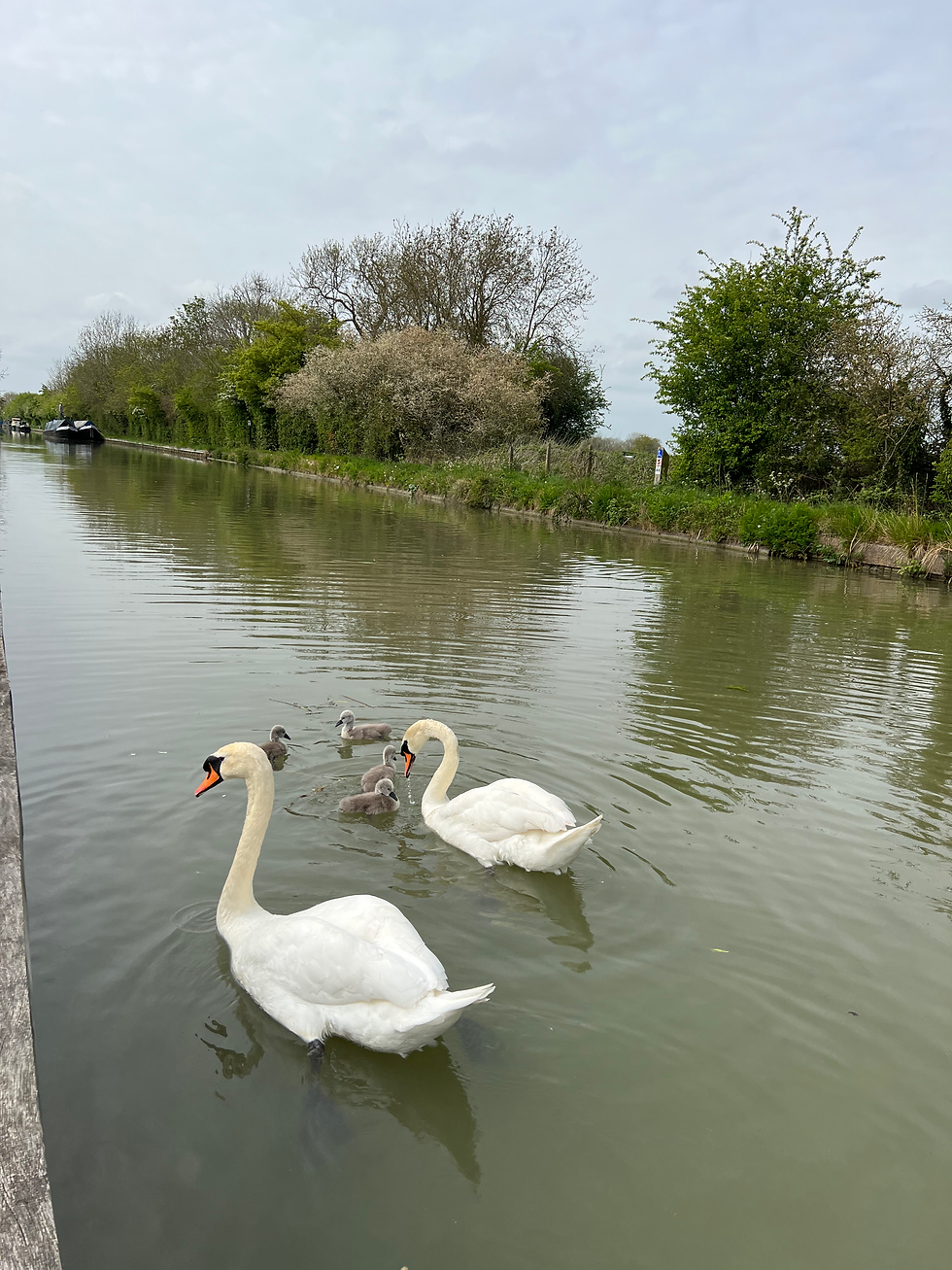Bin the Bread! Why Feeding Bread to Ducks and Swans isn't a great idea
- digi Developers
- May 8, 2025
- 4 min read

One of the simple pleasures of a narrowboat journey is watching ducks bobbing beside the boat, eagerly waiting for a snack. It's a scene as old as the canals themselves—children throwing chunks of bread into the water while delighted ducks snap them up. But what if we told you that this well-intentioned act of kindness might do more harm than good?
Many people are unaware that feeding bread to ducks is not only nutritionally poor for them but can also have lasting adverse effects on the environment. With thousands of ducks and other waterfowl populating the UK's canals and waterways, it is essential to ensure that we're supporting their health rather than unintentionally causing problems.
As part of our commitment to responsible boating and environmental stewardship, we offer every child travelling with us a free bag of Quack Snacks—a specially formulated, nutritious alternative to bread that keeps ducks healthy while protecting our beautiful waterways.

So, why should we rethink feeding ducks bread, and what should we offer them instead? Let's explore.
Why Bread Is Bad for Ducks
Who doesn't have childhood memories of feeding ducks and swans in the local park or down by the canal? The bread seemed to be just the food for any waterborne fowl; after all, they seemed to love it! But the reality is that bread is far from being suitable for them.
1. Bread Lacks Nutrients
Like all wild animals, ducks need a varied diet to stay healthy. In the wild, they eat aquatic plants, insects, seeds, and small invertebrates—foods that provide the needed proteins, vitamins, and minerals.
Bread is junk food for ducks. It fills them up quickly but provides very little nutritional value.
You wouldn't feed a child anything but white bread all day. While they may feel full after eating, ducks and swans do not receive the essential vitamins and minerals needed to remain strong and healthy.
A diet high in bread can lead to malnutrition over time, impacting growth, the ability to fight off diseases, and even reproductive success. Young ducklings that predominantly consume bread may develop poorly and have difficulty reaching adulthood.
2. 'Angel Wing' - sounds nice, but it isn't.
A lesser-known danger of a bread-rich diet on ducks is a condition called angel wing.
This disorder, caused by excessive carbohydrates and low-quality food, causes the duck's wing feathers to grow incorrectly, often sticking out rather than lying flat.
Angel wing is irreversible in adult ducks, leaving them unable to fly, vulnerable to predators, and unable to migrate. Sadly, many cases of angel wings can be traced back to human feeding habits—primarily a diet of bread, crackers, and other processed foods.
3. Bread Pollutes the Water
It's not just the ducks that suffer—our canals and waterways do, too. When uneaten bread is left floating in the water, it decomposes and encourages the growth of harmful algae. This process depletes oxygen levels in the water, creating dead zones where fish and other aquatic life struggle to survive. Additionally, bread waste attracts rats and other pests, disrupting delicate ecosystems and posing health risks to wildlife and boaters. So, while feeding ducks may seem like an innocent pastime, the long-term consequences of bread dumping can ripple beyond birds and out across the water they inhabit.
What to Feed Ducks Instead
Fortunately, plenty of healthy alternatives provide proper nutrition while keeping our waterways clean. If you're looking for better options, consider the following:
1. Specially Formulated Duck Food
By far, the best choice is food explicitly designed for ducks. Quack Snacks are floating pellets packed with essential nutrients, ensuring ducks get what they need without the harmful effects of bread.
Because they float, they also reduce food waste and prevent water contamination. Best of all, we're giving a free bag to every child who travels with us so families can enjoy the experience of feeding the ducks responsibly!
2. Leafy Greens and Veggies

Ducks love leafy greens like lettuce, kale, and spinach. Chopped-up vegetables such as peas, corn, and shredded carrots are also excellent choices, as they mimic some natural plant-based foods ducks eat in the wild.
3. Grains and Seeds

Whole grains like oats, barley, wheat, and birdseed are nutritious and easy for ducks to digest. They also sink more slowly than bread, reducing waste and water pollution.
4. Insects and Mealworms

If you want to treat the ducks, dried mealworms or insect-based treats are packed with protein and mimic the small invertebrates they naturally consume.
The Bigger Picture: Protecting Our Canals and Wildlife
The UK's canal network is a thriving ecosystem, home to various birds, fish, and plant life. As boaters and visitors, we are responsible for protecting this delicate balance.
Feeding ducks responsibly is just one small step toward ensuring our waterways remain clean and vibrant for generations. By ditching the bread and switching to better alternatives, we can:
✅ Support healthier duck populations
✅ Prevent pollution and algae growth
✅ Reduce waste and attract fewer pests
✅ Help educate future generations about responsible wildlife interaction
Join Us in Making a Difference
Watch for the ducks gliding alongside your boat next time you set off on a narrowboat journey. With a bag of Quack Snacks, you can enjoy this classic pastime the right way—helping ducks stay healthy, protecting the canals, and making memories with your family.
So, let's spread the word: no more bread for ducks! Instead, let's embrace healthier choices that benefit our feathered friends and the stunning waterways we all love.
Ready to get started?



Comments